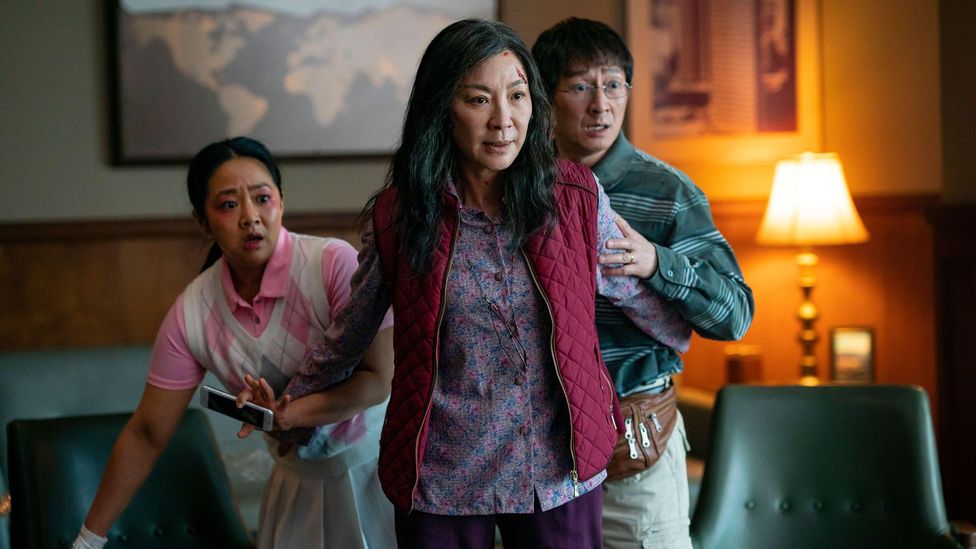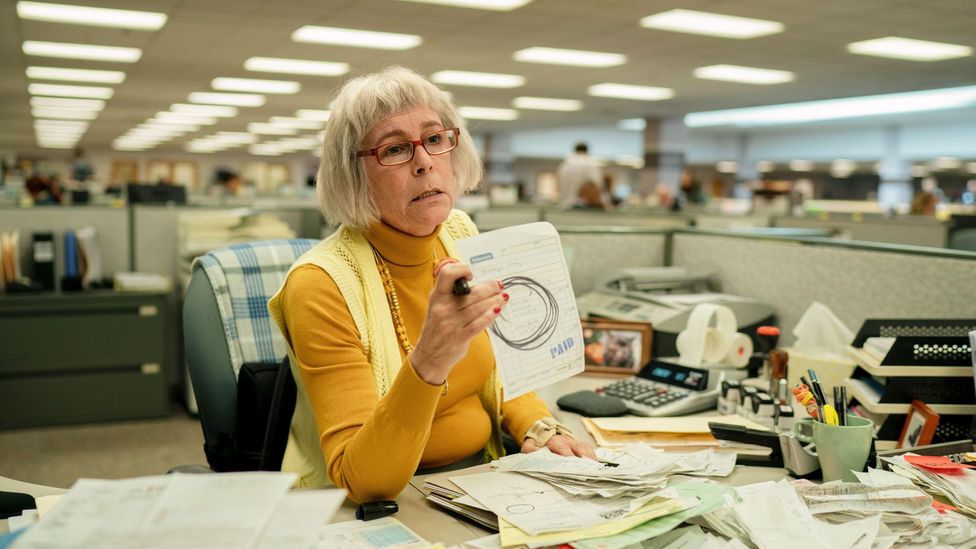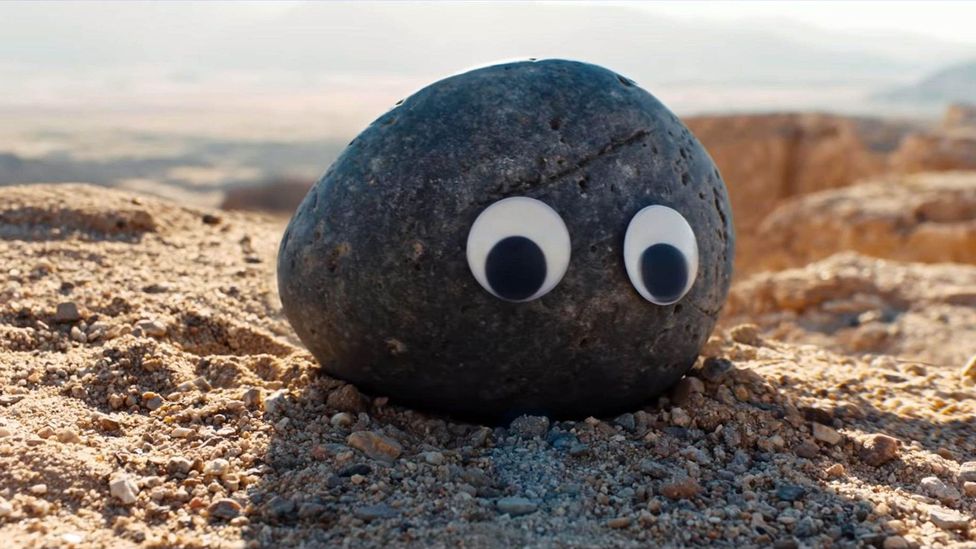No one saw this coming: Everything Everywhere All at Once, the wild, fragmented movie about an ordinary Chinese-American woman who jumps between universes, has become a commercial hit, catapulted the careers of its stars, Michelle Yeoh and Ke Huy Quan, to another level, and is the solid frontrunner for best picture at the Oscars. An oddball work of controlled chaos, it is only the second feature from Daniel Kwan and Daniel Scheinert, known as Daniels, whose previous film was the even quirkier Swiss Army Man (2016), with Daniel Radcliffe as a flatulent corpse. But now Daniels have won the best director award from the Directors Guild of America, and the film has earned the top prizes from the Screen Actors Guild and the Producers Guild, the three most reliable predictors of the best picture Oscar. How did this unlikely scenario happen? One major reason is that beneath its absurdist surface, EEAAO may be the most realistic, emotionally touching movie of the year.
More like this:
– 11 of the best films to watch this March
– The greatest monster movie ever made
– A new romcom upending Western myths
Kwan pointed out the film’s realism in a podcast about its evolution. “Everyone is in their own worlds. All the characters are speaking past each other. They’re talking different languages. The whole thing felt like an opportunity to show everyone that we already live in the multiverse,” he said. That may not be the multiverse of Dr Strange, but Kwan has a point. The film’s quickly-changing swirl of colours and places, including a now-famous universe where everyone has hot dogs for fingers, are outsized versions of today in all its disjointed, internet-busy frenzy. And beneath that is a deeper, more easily relatable realism, a story of family conflict and reconciliation. We are always attached to Evelyn, the often-baffled heroine played by Yeoh with immense warmth and wit. Even as she leaps from one iteration of herself to another – in one of the many overlapping worlds she is a martial arts movie star, in others a chef and even a small rock – we never lose sight of the original Evelyn who runs a laundromat, argues with her husband and daughter, and is just trying to get through a tax audit. Her steady, common-sense point of view carries us through the film.
That combination of a human heart, artistic ambition and a style that reflects our short-attention, TikTok era has propelled the film, made for less than $20 million, to more than $100 million at the box office so far, and 11 Oscar nominations. In the endless tug of war between Oscar voters who favour commercial hits and those who are devotees of inventive films with an indie sensibility, EEAAO checks both of those boxes.

Everything Everywhere, starring Michelle Yeoh, is set in a multiverse but also tells a story of family conflict (Credit: Alamy)
Its year-long awards journey started out in small, indie fashion. The film premiered in March 2022 at South by Southwest, a perfect fit for that festival’s younger audience and Daniels’ kinetic style. Glowing reviews gave it artistic cachet, and word of mouth helped fuel its popularity. Soon the breadth of its appeal emerged. Drawing multigenerational and multicultural audiences, and with tropes from martial arts, satire and surrealism, it truly has something for everyone, all in one movie.
This story offers three generations viewers can identify with. And the film’s appeal to immigrant families of all ethnicities is strong. Opinion pieces have been written about its particular resonance for Asian identity, embracing the idea that the film’s fragmented world reflects real life. “To be an immigrant is to live in a fractured multiverse,” the Princeton professor Anne Anlin Cheng wrote in The Washington Post.
Look at the first scenes, and it’s clear that the film, loopy though it becomes, is built on a bedrock of frenetic domestic realism. In the apartment behind the laundromat the Wang family owns, Evelyn is harried, cooking, sorting through tax receipts, running out front to deal with customers. Her husband, Waymond (Quan), is more madcap, putting googly eyes on the laundry bags. But he also has divorce papers in his hands, the only way he thinks he can get his wife’s attention. Their daughter, Joy (Stephanie Hsu), visits with her girlfriend, but Evelyn doesn’t dare tell her own Old World father that her daughter is gay. Googly eyes aside, it’s just like life in all its hectic overload.
Weird but relatable
When Evelyn and Waymond visit the tax office, the tone changes, and a mix of genres widens the film’s allure for varied audiences. A Waymond from an alternate universe instructs Evelyn on how to jump from one dimension to another so she can save the world by stopping the force of evil. The film’s martial-arts action begins full force as security guards come after him and alt-Waymond swings his fanny pack as a weapon. Yeoh, who built her career as a star of martial arts movies, and Quan, who has worked as a stunt coordinator, leap and kick with the best of them. The comedy can be absurd and wildly funny but is also tethered to real fears. Jamie Lee Curtis makes the dreaded tax auditor a cartoonish yet ominous figure, with her dour expression and frumpy clothes. The performance earned her an Oscar nomination for supporting actress and, in another sign of the film’s momentum, the Screen Actors Guild award, which almost everyone assumed would go to Angela Bassett.
And each universe has its own oddity. The one in which Evelyn is a chef offers a twist on the film Ratatouille. Here her colleague has a raccoon under his toque instead of a rat. In the movie-star universe, Evelyn has not married Waymond, but meets him again years later, both of them now sophisticated and successful. They talk on a moody, blue-tinged street that is a homage to the films of Wong Kar-wai at his most romantic. Such references give the film wit and are a treat for cinephiles, but the episodes also work for audiences that don’t pick up the allusions. EEAAO is ambitious but not pretentious, another plus for Oscar voters.

Jamie Lee Curtis plays a tax auditor who is cartoonish yet ominous (Credit: Alamy)
All that universe-leaping makes Evelyn second-guess her life choices, and the film raises existential questions. So did Swiss Army Man, in which Hank (Paul Dano), stranded on a deserted island, has conversations about life, death and sex with the corpse that has floated ashore. But Swiss Army Man has more cleverness than heart. In EEAAO the emotion is real even when the plot is outlandish. We soon learn that the evil force Evelyn must conquer, Jobu Tabacki, is Joy. In one universe Jobu is part of a nihilistic cult, in a place where a giant everything bagel (Daniels are not beyond sophomoric humour) can suck all the energy out of the world. “Nothing matters,” she tells Evelyn, who tries to convince her daughter that life itself matters. Weird but not unrelatable, their scenes are piercing reflections of their mother-daughter conflicts and their existential questions in our own universe.
Off-screen, EEAAO has a parallel universe of stories, the kind Oscar voters often embrace. Its nominations include Yeoh for best actress and Quan for best supporting actor, and through awards season – including Golden Globe and SAG awards for both of them – the film’s campaign has been enhanced by the actors’ personal stories. Yeoh, the star of the classic, 2000 martial-arts film Crouching Tiger, Hidden Dragon, has had smaller roles lately in Hollywood films, including the mother-in-law in Crazy Rich Asians. But she has also been undervalued for years. The first Asian nominated for an Oscar for lead actress, she has leaned into the significance of her recognition. As she said in her Golden Globes acceptance speech, “When I first got to Hollywood it was a dream come true until I got here, because I came here and was told ‘You’re a minority,'” and was dismissed as a possible lead. Her response is both sincere and smart campaigning. Oscar voters love a poignant, relevant speech.
They also love a comeback story, and Quan has a great one. After being a child actor, playing Short Round in Indiana Jones and the Temple of Doom (1984), he couldn’t find work, and virtually stopped acting for decades. In his Golden Globes acceptance speech for supporting actor, he said, “For so many years I was afraid I had nothing more to offer, that whatever I did would never surpass what I did as a kid.” Who wouldn’t root for these two?

Although Everything Everywhere is absurdist and weird, underlying that are real and universal emotions (Credit: Alamy)
Of course, nothing is certain at the Oscars, especially because the best picture winner is decided by a ranked ballot, with voters listing first, second and third choices. If no film has 50% of first-place votes, the count continues. (It’s so complicated the Academy has posted an explainer video.) There’s a case to be made that people who favour more conventional narratives might not rank EEAAO very high, allowing another strong film like The Banshees of Inisherin to take the lead. The movie with a black hole bagel might be too much for some of them.
But maybe not. At the end of the film, in an eloquent scene in the parking lot outside the Wangs’ laundry, Joy insists that she and her mother might as well part ways, but Evelyn refuses, telling her daughter that she chooses to be with her in this universe or any other. “I will always, want to be here with you,” she says. As in life, it is not a statement of total understanding, but of unbreakable, eternal love. That emotion is far from cynicism or the sappiness of so many Hollywood hits. And, ironically, that genuine, un-Hollywood feeling is why Everything Everywhere All at Once could be the Oscar voters’ favourite.